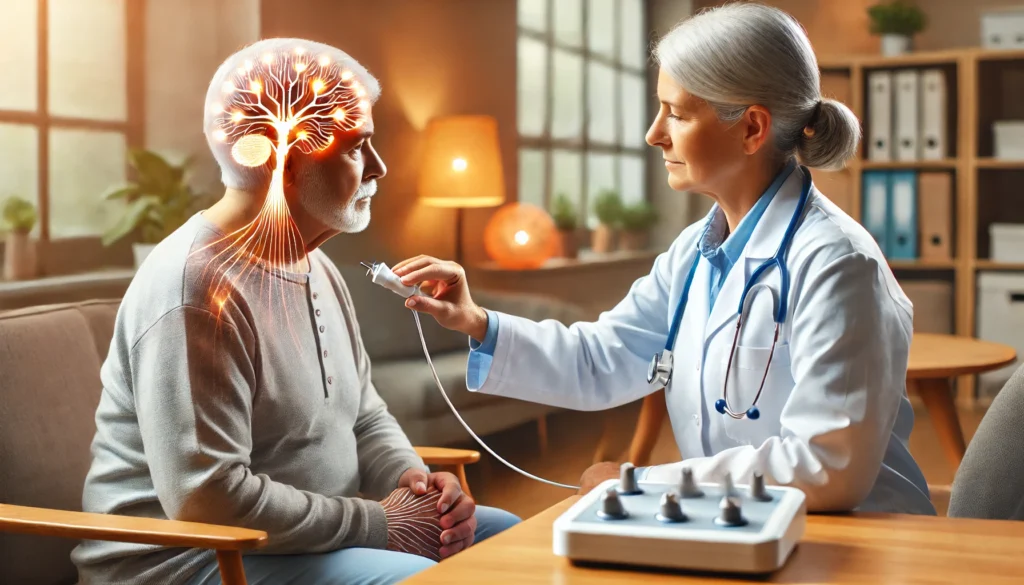Dementia, a chronic and progressive condition characterized by a decline in cognitive function, presents a significant challenge to individuals, families, and healthcare systems worldwide. Despite extensive research, dementia remains incurable. However, innovative approaches are constantly being developed to manage symptoms and improve the quality of life for those affected. This article delves into the latest advancements in dementia treatments, exploring their potential impact on disease progression and patient care.
You may also like: Tips to Improve Low Average Memory Performance
Understanding Dementia: A Complex Condition
Before delving into the treatments, it’s essential to understand dementia’s complexity. Dementia is not a single disease but a term that encompasses various conditions resulting in cognitive impairment. Alzheimer’s disease is the most common form, but other types include vascular dementia, Lewy body dementia, and frontotemporal disorders.
Dementia Pathophysiology
The pathophysiology of dementia involves the degeneration of brain cells, leading to impaired memory, reasoning, and other cognitive functions. This degeneration can be caused by several factors, including genetics, environmental influences, and lifestyle choices. Understanding these underlying mechanisms is crucial for developing effective treatments.
- Genetic Factors: Certain genetic mutations can predispose individuals to dementia, particularly familial Alzheimer’s disease. Research into these genetic factors is vital for developing targeted therapies that could potentially delay or prevent the onset of symptoms.
- Environmental Influences: Exposure to toxins, pollutants, and other environmental factors can contribute to brain cell damage. Investigating these influences further is essential for creating preventative strategies and mitigating the risk of dementia.
- Lifestyle Choices: Lifestyle factors, such as diet, exercise, and mental stimulation, significantly impact brain health. Developing guidelines that promote brain-friendly lifestyles could be a key component in reducing dementia prevalence.
Rapid Onset and Progressive Dementia
Dementia can manifest rapidly or progress slowly over years. Rapid onset dementia might be triggered by factors such as infections, metabolic imbalances, or trauma. In contrast, progressive dementia, such as Alzheimer’s, advances gradually, worsening over time. Recognizing the signs of advanced dementia, like disorientation, language difficulties, and behavioral changes, is vital for timely intervention.
- Triggers of Rapid Onset Dementia: Conditions like encephalitis or metabolic disorders can lead to a quick decline in cognitive functions. Understanding these triggers can aid in swift diagnosis and treatment to stabilize the patient’s condition.
- Signs of Progressive Dementia: The slow progression of diseases like Alzheimer’s requires careful monitoring of symptoms. Early detection and intervention can help manage symptoms more effectively and improve patient outcomes.
The importance of timely diagnosis in the realm of health and wellness cannot be overstated. When a health issue is identified early on, it opens the door for prompt intervention strategies that can play a crucial role in managing the condition effectively. This early recognition not only helps to slow down the progression of the disease but also significantly enhances the overall quality of life for the patient. By addressing health concerns at an initial stage, individuals can benefit from a variety of treatment options and lifestyle adjustments that may otherwise not be available if the diagnosis were delayed. In essence, catching a disease early facilitates proactive measures that can lead to better health outcomes and a more satisfying daily life.
- Educating healthcare professionals and the public on recognizing early symptoms is crucial for facilitating this process.
Current Approaches to Dementia Treatment
Currently, there is no cure for dementia, but treatments aim to alleviate symptoms and slow progression. These approaches can be broadly categorized into pharmacological and non-pharmacological treatments.

Pharmacological Treatments
Medications such as cholinesterase inhibitors (e.g., Donepezil) and NMDA receptor antagonists (e.g., Memantine) are commonly prescribed to manage dementia symptoms. These drugs work by modulating neurotransmitter activity in the brain, potentially improving memory and cognitive function.
- Mechanism of Action: Cholinesterase inhibitors increase the levels of acetylcholine, a neurotransmitter crucial for memory and learning. NMDA receptor antagonists regulate glutamate activity, another neurotransmitter involved in cognitive functions.
- Challenges in Medication Efficacy: While these medications can improve symptoms, they do not halt disease progression. Research is ongoing to develop drugs that can address the root causes of dementia.
- Emerging Drug Therapies: New treatments, such as anti-amyloid antibodies, are being developed to target specific pathological features of dementia. These therapies show promise but require extensive trials to establish their safety and effectiveness.
Non-Pharmacological Treatments
Non-drug interventions play a crucial role in dementia management. Cognitive stimulation therapy, physical exercise, and dietary modifications have shown potential benefits in enhancing cognitive abilities and overall well-being. Additionally, personalized care plans that involve family support and social engagement can significantly improve the quality of life for individuals with dementia.
- Cognitive Stimulation and Rehabilitation: Engaging patients in mentally stimulating activities can help maintain cognitive function. Programs tailored to individual capabilities and interests can be particularly effective.
- Physical Exercise and Brain Health: Regular physical activity has been linked to better cognitive function and reduced risk of dementia. Exercise programs designed for dementia patients can improve physical and mental health.
- Dietary and Lifestyle Modifications: Diets rich in antioxidants, omega-3 fatty acids, and other brain-healthy nutrients can support cognitive function. Coupled with lifestyle changes, these dietary adjustments can form a comprehensive approach to dementia care.
Innovative Approaches in Dementia Treatment
The pursuit of innovative treatments continues to drive research and development in dementia care. Several emerging therapies offer hope for future breakthroughs.
Gene Therapy and Precision Medicine
Gene therapy aims to correct genetic defects that contribute to dementia. By targeting specific genes associated with neurodegeneration, researchers hope to alter disease progression. Precision medicine, which tailors treatments based on an individual’s genetic makeup, holds promise for personalized dementia care.
- Advancements in Gene Editing: Techniques such as CRISPR are being explored to edit genes involved in dementia. These advancements could lead to breakthroughs in preventing or slowing down the disease process.
- Genetic Profiling and Risk Assessment: Identifying genetic markers associated with dementia can help in assessing risk and tailoring preventive strategies for at-risk individuals.
- Personalized Treatment Plans: Precision medicine’s approach to customizing treatments based on genetic information could revolutionize dementia care, offering more targeted and effective interventions.
Neurostimulation Techniques
Neurostimulation methods, such as transcranial magnetic stimulation (TMS) and deep brain stimulation (DBS), are being investigated for their potential to enhance cognitive function. These techniques involve non-invasive or minimally invasive procedures that stimulate specific brain regions, potentially improving memory and cognitive abilities in dementia patients.
- Mechanisms of Neurostimulation: TMS and DBS work by modulating brain activity in targeted areas. Research is ongoing to determine optimal protocols for improving cognitive outcomes in dementia.
- Clinical Trials and Efficacy: Numerous clinical trials are underway to evaluate the efficacy and safety of neurostimulation techniques. These studies aim to establish their role in standard dementia treatment protocols.
- Potential Integration into Treatment Plans: If proven effective, neurostimulation could become a valuable addition to existing treatment regimens, offering new hope for improving cognitive function in dementia patients.
Lifestyle Interventions and Biohacking
Lifestyle modifications, including regular physical activity, a balanced diet, and mental exercises, can play a significant role in managing dementia symptoms. Biohacking, a practice that involves experimenting with diet, supplements, and technology to optimize health, has gained traction among those seeking to enhance brain function and delay cognitive decline.
- The Role of Physical Activity: Exercise not only improves physical health but also enhances brain function, potentially delaying the onset of dementia symptoms. Tailored exercise programs can cater to the needs and abilities of dementia patients.
- Nutritional Strategies for Brain Health: A diet rich in brain-boosting nutrients can support cognitive function. Researchers are exploring specific dietary interventions that could offer protective benefits against dementia.
- Biohacking and Cognitive Enhancement: The biohacking movement explores unconventional methods to boost brain performance. While some practices show promise, further research is needed to validate their effectiveness and safety in dementia care.

Future Implications and Challenges
While innovative approaches to dementia treatment offer hope, several challenges remain. The complexity of dementia pathophysiology, coupled with individual variability, makes developing universally effective treatments difficult. Additionally, ethical considerations, such as informed consent and potential risks, must be addressed, especially in experimental therapies.
The Role of Public Awareness and Education
Raising awareness about dementia and promoting early diagnosis are critical steps in improving outcomes for affected individuals. Public education campaigns can help dispel myths, reduce stigma, and encourage individuals to seek medical advice if they experience cognitive changes.
- Dispelling Myths and Stigma: Public misconceptions about dementia can hinder diagnosis and treatment. Education initiatives aim to correct misinformation and foster a more supportive environment for those affected.
- Importance of Early Detection: Educating the public on recognizing early signs of dementia can lead to prompt intervention, which is crucial for managing symptoms and improving quality of life.
- Community Support and Resources: Providing resources and support for caregivers and families is essential. Strengthening community networks can enhance the care and support available to dementia patients and their loved ones.
Collaborative Efforts in Research and Healthcare
Collaboration between researchers, healthcare professionals, policymakers, and patient advocacy groups is essential for advancing dementia care. By pooling resources and knowledge, stakeholders can accelerate the development and implementation of effective treatments.
- Interdisciplinary Research Initiatives: Collaborative research efforts can lead to more comprehensive studies, integrating various perspectives and expertise to tackle the complexities of dementia.
- Policy Development and Implementation: Policymakers play a crucial role in facilitating research and access to treatments. Developing policies that support innovation and patient care is vital for advancing dementia treatment.
Patient advocacy and involvement play a crucial role in the landscape of healthcare, particularly in the realm of research and policy development. By actively engaging patients and their advocacy groups in these important discussions, we can ensure that the treatments and interventions being developed are closely aligned with the genuine needs and priorities of those affected by health conditions, including dementia. This collaborative approach not only fosters a more comprehensive understanding of the challenges faced by patients, but it also serves to enhance the overall effectiveness and relevance of dementia care strategies. As a result, patients can benefit from more personalized and effective treatments that truly reflect their experiences and concerns.

Conclusion
Dementia remains a formidable challenge, but innovative approaches in treatment offer a glimmer of hope. While a cure for dementia is still elusive, ongoing research and development are paving the way for more effective management strategies. By embracing a multidisciplinary approach and incorporating cutting-edge therapies, we can improve the quality of life for those living with dementia and their families. As we continue to explore the frontiers of neuroscience and medicine, it is crucial to remain optimistic and committed to finding solutions for this complex condition.
Further Reading:
Dementia treatment options and developments
Treatment Options for Dementia
The Latest Advances in the Diagnosis and Treatment of Dementia
Important Note: The information contained in this article is for general informational purposes only, and should not be construed as health or medical advice, nor is it intended to diagnose, prevent, treat, or cure any disease or health condition. Before embarking on any diet, fitness regimen, or program of nutritional supplementation, it is advisable to consult your healthcare professional in order to determine its safety and probable efficacy in terms of your individual state of health.
Regarding Nutritional Supplements Or Other Non-Prescription Health Products: If any nutritional supplements or other non-prescription health products are mentioned in the foregoing article, any claims or statements made about them have not been evaluated by the U.S. Food and Drug Administration, and such nutritional supplements or other health products are not intended to diagnose, treat, cure, or prevent any disease.


